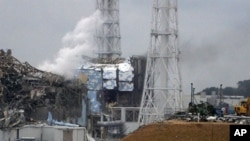U.S Nuclear Regulatory Chairman Gregory Jaczko told a congressional panel that his commission is recommending a larger evacuation radius from Japan's Fukishima nuclear plant than Japan has ordered.
Jaczko arrived late to Wednesday's hearing because he had been called for a meeting to the White House on Japan's nuclear crisis. Jaczko described the dire situation at Japan's Fukishima nuclear plant, saying radiation levels at the fourh reactor at that plant are "extremely high." He said the State Department is issuing a new recommendation for U.S. citizens in Japan.
"For a comparable situation in the United States, we would recommend an evacuation to a much larger radius than has currently been provided in Japan," he said.
Watch William Ide's report on the severity of the nuclear crisis
Jaczko said the U.S. Ambassador in Japan has been told that it would be appropriate to evacuate U.S. citizens to a 80 kilometer radius from the Fukishima nuclear plant. Japan had ordered citizens to take precautions within a 30 kilometer-radius, with a 20 kilometer evacuation radius from the nuclear plant, and advising those within a 30 kilometer radius to stay indoors.
The combined natural disasters of an earthquake and a tsunami have put Japan's Fukishima nuclear power plant in danger of a meltdown. Jaczko and Energy Secretary Steven Chu were both on Captiol Hill to testify on their agencies' budget proposals for 2012, but the crisis in Japan dominated the hearing.
Democratic Congresswoman Doris Matsui of California expressed the concern felt by many across the world when she posed this question to Energy Secretary Chu: "Mr. Secretary, what happens if there is a meltdown in one or more of the Japanese reactors, and the containment system fails?"
Chu said he is getting conflicting reports from Japan about the current situation. "We are trying to monitor very closely, we hear conflicting reports about exactly what is happening at the several reactors that are now at risk, and I would not want to speculate on exactly what will happen," he said.
Chu admitted that the situation in Japan is already worse than the nuclear disaster at Three Mile Island in the U.S. state of Pennsylvania in 1979, America's worst nuclear accident. Nuclear Regulatory Chairman Jaczko sought to reassure Americans that nuclear power plants are built in the United States to withstand earthquakes, tsunamis and all kinds of natural disasters. Energy Secretary Chu reaffirmed President Obama' support for nuclear power as one of a diverse set of energy sources, and said the adminstration is committed to learning from Japan.
A number of U.S. lawmakers expressed their support for nuclear power as an important source of electricity and of well-paid jobs for those who work at the 104 nuclear plants in the United States.
"Obviously nuclear energy plays a vital role in the energy needs of our country today. It provides roughly 20 percent of all electricity generated in America," said Republican Congressman Ed Whitfield of Kentucky.
But some, such as Democratic Representative Ed Markey of Massachusetts, said the unfolding tragedy in Japan should make the United States fundamentally re-think its energy policy as other countries are.
"China, Venezuela, Germany, Switzerland and other countries are shutting down older plants and scrapping plans for new ones. We too need a seismic shift in our approach to nuclear reactor safety," Markey said.
In its 2012 budget proposal, the Obama administration has asked for an additional $36 billion for loan guarantees for nuclear power plant construction.




